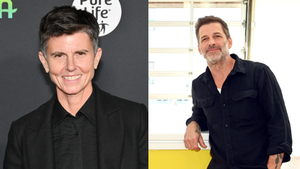Treatment GuideJust DiagnosedSex & DatingAfrican AmericanStigmaAsk the HIV DocPrEP En EspañolNewsVoicesPrint IssueVideoOut 100
CONTACTCAREER OPPORTUNITIESADVERTISE WITH USPRIVACY POLICYPRIVACY PREFERENCESTERMS OF USELEGAL NOTICE
© 2025 Pride Publishing Inc.
All Rights reserved
All Rights reserved
By continuing to use our site, you agree to our Privacy Policy and Terms of Use.
In the concluding scenes of the documentary Sex Positive, which chronicles Richard Berkowitz's efforts in the early 1980s to get gay men to embrace safer-sex practices to save themselves from certain death, some of the people working at today's most prominent agencies that focus on making people aware of how to protect themselves and others from HIV are asked if they've heard of Berkowitz. And each says no. Both Berkowitz and his friend Michael Callen (who did become a revered voice in the AIDS fight before he died of the disease in 1993) took up the disease-control concepts of their physician and friend, Joseph Sonnabend, and began urging gay men to avoid unprotected sex as early as 1982 -- and were treated as pariahs by a segment of the gay community that accused them of being sex-negative. Inspired by Berkowitz's book, Stayin' Alive: The Invention of Safe Sex, published in 2003, Sex Positive brings to light -- through Berkowitz's eyes as well as through those of some who once stood against him -- the daunting quest he took on to save the lives of the men around him and ended up making the concept of 'safer sex' almost second nature for today's generation. WATCH SCENES FROM SEX POSITIVE, THE DOCUMENTARY ABOUT RICHARD BERKOWITZ AND HIS PART IN CREATING SAFER-SEX PRACTICES How was it making this film-to revisit that period in the '80s when AIDS came out of nowhere and to dredge up those memories? Has it changed you? [Sighs] Immensely! For so many years, there was this sense of not being-- It wasn't about getting credit for me -- or me and Michael and Sonnabend. It was frustrating not being able to get the community to understand that we had something important to contribute all these years -- that I had something to contribute all these years. And I never really gave up! But I think the catharsis that came from the movie is to finally get all of this out of my system and have a record of it on film. What I've learned is that the safe-sex message I've been writing about for 25 years -- which gay men in my generation were made to feel that we were making the gay community look bad at the time -- I think I was waiting for a new generation to share it with. And I am so grateful to be alive to have seen it. I'm meeting them at film festivals, and their responses to me and to the movie have just been...you know, I couldn't have asked for anything more. The film jumps directly into your complex sexual history -- your experiences as a hustler as an S/M top -- and obviously sexuality is intimately connected with HIV and safer sex, but at times you were clearly uncomfortable with talking so openly. What finally allowed you to be so open? Daryl [Wein, the director] was really fascinated to get right down to the sexually graphic stuff. I wasn't comfortable with all the questions that he asked me, and I think it's OK that that discomfort is shown on the screen -- because I think ultimately it is a documentary, and the most important thing it does is answer the question of where safe sex came from. Michael and I were members of the first public AIDS support group in 1982 in New York City, and we'd sit around with a bunch of gay men with AIDS -- it was all gay men -- and Michael had a way of pulling the most graphic personal sexual details out of people that would kind of bond the group together in the honesty of it. But then a TV news crew would come in to interview people in the support group, and everyone would put on their public face: 'I don't know why I got AIDS.' You know? They would suddenly clean up their whole history as if it didn't exist. And we understood. We understood that. But Michael and I thought that with so many gay men dying, and with sex being at the center of what was happening, that it was absolutely vital for us to talk honestly about our sexual lives. So when Daryl started asking me questions for the movie, there was just no way I was going to equivocate. The primary conflict in the film is how there were two camps on opposing sides of the issue. There was you, as the underdog, with the radical kernel of truth about what was going on with the expression of sexual freedom, the spread of the virus, and what was coming in the epidemic. And then there was the other camp, which didn't want to talk so much about gay men's sexual nature. The flash point was the word 'promiscuity.' Do you regret using that word, since there was such a strong response to it? One of the shocking things that Michael learned from our first published article, 'We Know Who We Are: Two Gay Men Declare War on Promiscuity,' [published in the New York Native in November 1982], was that gay men never hesitated to use the word 'promiscuity' as long as they were celebrating it. But the minute you were using it in any sense that was critical, all of a sudden there's a whole other reaction -- that you are sex-negative, that you have problems with sexuality. But the whole country was waking up to the epidemic, and I think some gay men were so afraid that if anything was said that would make them look bad (that they were 'promiscuous' or 'sexually active'), it would scare mainstream America and that it would just prolong the inability to get funding to fight the disease, that it would threaten the kind of massive help that the community needed. Today, we have a clear understanding of unsafe sex, but many people are still choosing to 'bareback,' either through serosorting -- having sex exclusively with other HIV-positive men -- or by weighing intimacy and sexual freedom against the risk of contracting HIV. Isn't that essentially the same argument upheld in the film by the camp that was against you? I really sympathize and identify very strongly with today's generation. You see, as funding for AIDS went up and budgets increased, the people in charge became more conservative, became more afraid of offending anyone, became more about making safe-sex messages one size fits all. And I think that's been a disaster! In the late '80s, when porn stars and sex workers and grassroots activists and radicals took charge of making the campaigns and creating the erotic images that went with them, they knocked on bathhouse doors and went to speak at places where gay men were actually having sex. It was provocative. It spoke to 'sluts.' They understood that you cannot tell gay men to use a condom for anal sex unless you first celebrate the act! But now we've had 10, 12, 13 years of this kind of one-size-fits-all, bland, conservative safe-sex education messages that, if I was 23, I would turn off to that too! But at one point you also had to deal in the '80s with gay men turning off to your message. That was a turning point in the film, where you took words like 'promiscuity' out of the discussion and made your safe-sex education about having as much sex as men wanted to -- but to make use of condoms for protection. Yeah. Instead of the word 'promiscuity,' we used 'sexually active.' But it didn't change what we were saying; it's just we were sensitive to the terminology that we were using. We understood people's emotional reaction to it because of the time. Well, we now have 'safe sex.' We are educated and equipped with the rules of safe behavior. But still, almost three decades later, the infection rates are climbing. What do you think is the disconnect? Most of the stuff that's out there really doesn't speak to the [sexually active gay and bisexual men] that comprise half to two thirds of the entire epidemic! I don't think that what's out there is speaking to a horny gay guy who shows up at a bathhouse at 3 o'clock in the morning, who walks past the poster or brochure. I don't think there is much stuff out there that speaks to them! What do you think is missing? A celebration of anal orgasm. If you don't understand, if you don't celebrate anal sex, then you have no business talking about it to gay men who have made a decision to engage in it and who understand it's an important part of their identity and their humanity and their sexual expression. You talk at the end of the film about the positive work that the gay community has done to contain this virus and the countless number of lives that have been saved, yet how no one has given us -- and, in my opinion, even you -- the pat on the back that we deserve. We need to celebrate our successes, and no one has ever done it! You know? And I think it's this crisis mentality of making sure the funding keeps going and making sure people know it's a problem. No one ever took a moment to say,''You know, you may not like the fact that young cute guys can go out and fuck whomever they want, but the rates aren't that bad!' You know? When [the experts] come out with these statistics that say HIV infection rates in gay men have risen 19%, well, is that 19 cases or 1,900 cases? Usually, when experts speak in terms of percentages, it's to make the numbers look bigger than they are. When the battle is over and we find a cure, how would you like the gay community to be remembered in this fight? Heroically. Getting off your ass and getting into the streets and doing something to fight AIDS in the early '80s was heroic! We made mistakes along the way, but at least we got off our butts and did something to help each other, to find out what was going on, to inform other people, to figure out what we had to do to protect ourselves, and get the resources that we needed. I think it's an incredibly heroic story. How do you want to be remembered? I would like to be remembered as having been part of the collaboration that showed gay men not just how to protect themselves but also that there was a need to care about each other. At one point in the film you mention that if you do a Google search of your name, the search comes up in a way that you're 'tied in with all these lunatics.' [Laughs uproariously] After this film, not anymore!
From our Sponsors
Most Popular
“So much life to live”: Eric Nieves on thriving with HIV
September 03 2025 11:37 AM
Thanks to U=U, HIV-positive people can live long, happy, healthy lives
July 25 2025 2:37 PM
The Talk: Beyond the exam room
August 13 2025 3:15 PM
BREAKING: Supreme Court rules to save free access to preventive care, including PrEP
June 27 2025 10:32 AM
Messenger RNA could be the key to an HIV vaccine — but government cuts pose a threat
August 20 2025 8:02 AM
“I felt like a butterfly”: Niko Flowers on reclaiming life with HIV
July 23 2025 12:22 PM
Dancer. Healer. Survivor. DéShaun Armbrister is all of the above
July 02 2025 8:23 PM
The Talk: Starting the conversation
July 25 2025 4:47 PM
The lab coat just got queer
August 21 2025 10:00 AM
Plus: Featured Video
Latest Stories
HIV-positive men stage 'Kiss-In' protest at U.S.-Mexico border
December 01 2025 12:56 PM
What the AIDS crisis stole from Black gay men
December 01 2025 6:00 AM
Amazing People of 2025: Javier Muñoz
October 17 2025 7:35 PM
It’s National PrEP Day! Learn the latest about HIV prevention
October 10 2025 9:00 AM
“I am the steward of my ship”: John Gibson rewrites his HIV narrative
September 16 2025 2:56 PM
The Talk: Owning your voice
August 25 2025 8:16 PM
The Talk: Navigating your treatment
August 01 2025 6:02 PM
How the Black AIDS Institute continues to fill in the gaps
July 25 2025 1:06 PM
1985: the year the AIDS crisis finally broke through the silence
June 26 2025 11:24 AM
VIDEO: A man living with HIV discusses his journey to fatherhood
June 10 2025 4:58 PM
Trump admin guts $258 million in funding for HIV vaccine research
June 03 2025 3:47 PM
Grindr is reminding us why jockstraps are so sexy and iconic
May 02 2025 5:36 PM
HRC holds 'die-in' to protest Trump health care cuts
April 28 2025 2:11 PM
Two right-wing Supreme Court justices signal they may uphold access to PrEP and more
April 21 2025 4:10 PM
500,000 Children at Risk: PEPFAR Funding Crisis
April 08 2025 3:51 PM
Broadway's best raise over $1 million for LGBTQ+ and HIV causes
April 03 2025 7:15 PM
The Talk Season 5 premieres this spring with HIV guidance for the newly diagnosed
March 26 2025 1:00 PM








































































